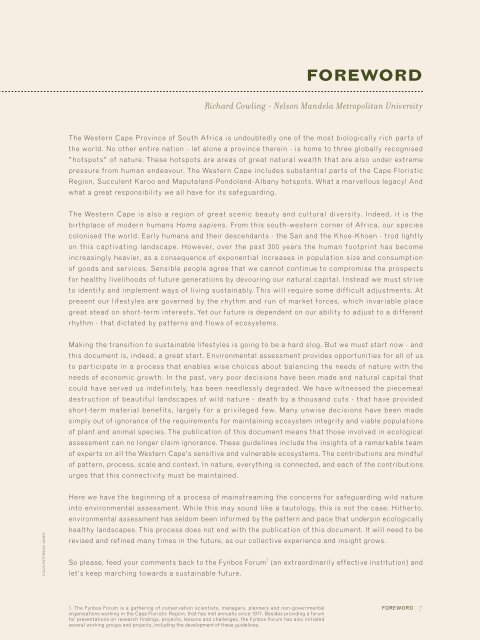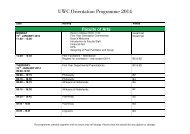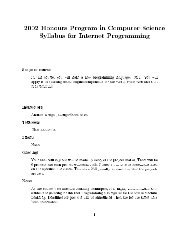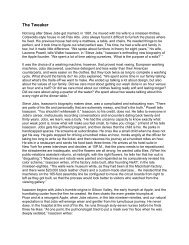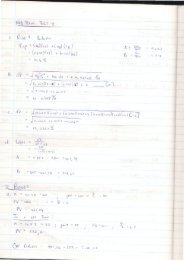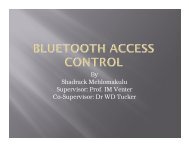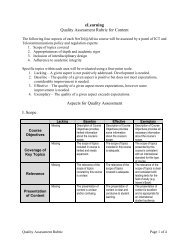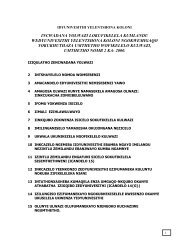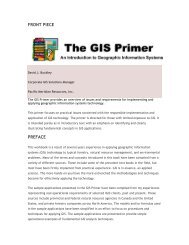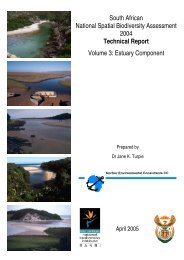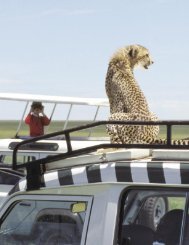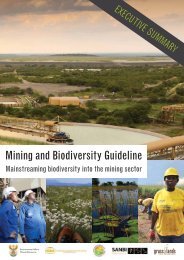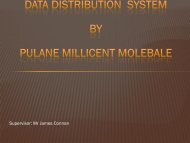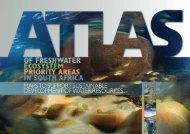Ecosystem Guidelines for Environmental Assessment
Ecosystem Guidelines for Environmental Assessment
Ecosystem Guidelines for Environmental Assessment
You also want an ePaper? Increase the reach of your titles
YUMPU automatically turns print PDFs into web optimized ePapers that Google loves.
FOREWORD<br />
Richard Cowling - Nelson Mandela Metropolitan University<br />
The Western Cape Province of South Africa is undoubtedly one of the most biologically rich parts of<br />
the world. No other entire nation - let alone a province therein - is home to three globally recognised<br />
"hotspots" of nature. These hotspots are areas of great natural wealth that are also under extreme<br />
pressure from human endeavour. The Western Cape includes substantial parts of the Cape Floristic<br />
Region, Succulent Karoo and Maputaland-Pondoland-Albany hotspots. What a marvellous legacy! And<br />
what a great responsibility we all have <strong>for</strong> its safeguarding.<br />
The Western Cape is also a region of great scenic beauty and cultural diversity. Indeed, it is the<br />
birthplace of modern humans Homo sapiens. From this south-western corner of Africa, our species<br />
colonised the world. Early humans and their descendants - the San and the Khoe-Khoen - trod lightly<br />
on this captivating landscape. However, over the past 300 years the human footprint has become<br />
increasingly heavier, as a consequence of exponential increases in population size and consumption<br />
of goods and services. Sensible people agree that we cannot continue to compromise the prospects<br />
<strong>for</strong> healthy livelihoods of future generations by devouring our natural capital. Instead we must strive<br />
to identify and implement ways of living sustainably. This will require some difficult adjustments. At<br />
present our lifestyles are governed by the rhythm and run of market <strong>for</strong>ces, which invariable place<br />
great stead on short-term interests. Yet our future is dependent on our ability to adjust to a different<br />
rhythm - that dictated by patterns and flows of ecosystems.<br />
Making the transition to sustainable lifestyles is going to be a hard slog. But we must start now - and<br />
this document is, indeed, a great start. <strong>Environmental</strong> assessment provides opportunities <strong>for</strong> all of us<br />
to participate in a process that enables wise choices about balancing the needs of nature with the<br />
needs of economic growth. In the past, very poor decisions have been made and natural capital that<br />
could have served us indefinitely, has been needlessly degraded. We have witnessed the piecemeal<br />
destruction of beautiful landscapes of wild nature - death by a thousand cuts - that have provided<br />
short-term material benefits, largely <strong>for</strong> a privileged few. Many unwise decisions have been made<br />
simply out of ignorance of the requirements <strong>for</strong> maintaining ecosystem integrity and viable populations<br />
of plant and animal species. The publication of this document means that those involved in ecological<br />
assessment can no longer claim ignorance. These guidelines include the insights of a remarkable team<br />
of experts on all the Western Cape's sensitive and vulnerable ecosystems. The contributions are mindful<br />
of pattern, process, scale and context. In nature, everything is connected, and each of the contributions<br />
urges that this connectivity must be maintained.<br />
COLIN PATERSON-JONES<br />
Here we have the beginning of a process of mainstreaming the concerns <strong>for</strong> safeguarding wild nature<br />
into environmental assessment. While this may sound like a tautology, this is not the case. Hitherto,<br />
environmental assessment has seldom been in<strong>for</strong>med by the pattern and pace that underpin ecologically<br />
healthy landscapes. This process does not end with the publication of this document. It will need to be<br />
revised and refined many times in the future, as our collective experience and insight grows.<br />
So please, feed your comments back to the Fynbos Forum 1 (an extraordinarily effective institution) and<br />
let’s keep marching towards a sustainable future.<br />
1. The Fynbos Forum is a gathering of conservation scientists, managers, planners and non-governmental<br />
organisations working in the Cape Floristic Region, that has met annually since 1977. Besides providing a <strong>for</strong>um<br />
<strong>for</strong> presentations on research findings, projects, lessons and challenges, the Fynbos Forum has also initiated<br />
several working groups and projects, including the development of these guidelines.<br />
FOREWORD : 7


